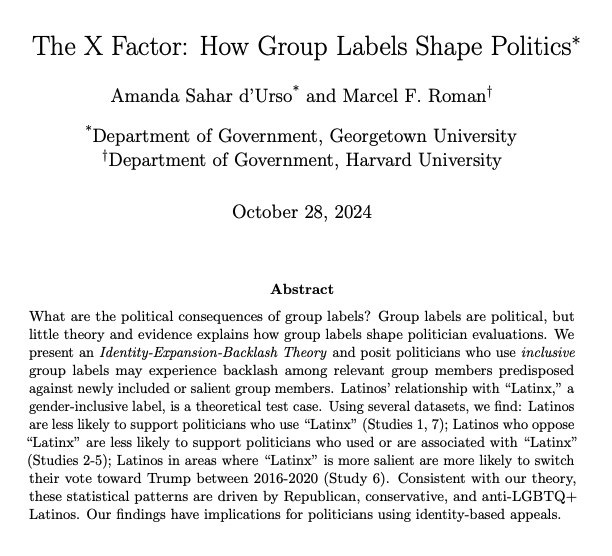Why are Latinos voting for Trump? @asdurso and I explain part of the puzzle in a new working paper. We show Latinos have backlashed against Democratic politicians due to their usage of, and association with, the gender-inclusive group label "Latinx" 1/n marcelroman.com/pdfs/wps/latin…

"Latinx," a gender-inclusive phrase used to explicitly include gender minorities and broader LGBTQ+ community segments, has become increasingly salient over time: more internet search interest, academic/media usage, and, importantly, usage by Democratic Party politicians. 2/n 





We develop an Identity-Expansion-Backlash Theory and predict, the use of inclusive group labels may have limited electoral benefit while alienating group members predisposed against the inclusivity of the marginalized intra-group subset. 3/n 

We find evidence supporting the theory. Using several cross-sectional and panel datasets, we show opposition to “Latinx” is negatively associated with support for Democratic Party politicians. These associations are driven by conservative and anti-LGBTQ+ Latinos. 4/n 



Moreover, we use a large sample of Latinos surveyed after the 2020 election to show that Latinos living in areas where “Latinx” was more salient pre-election are more likely to switch their vote to Trump between 2016-2020. This association is driven by anti-gay Latinos. 5/n 

Finally, we use toplines and a pre-registered survey experiment to provide causal evidence that politicians who use "Latinx" (instead of "Latino") to refer to Latinos garner less support from segments of the Latino community who are predisposed against LGBTQ+ people. 6/n 





Amanda and I think we should still be using gender-inclusive language. The problem for Democrats is that segments of the Latino community that are queerphobic and would otherwise support them are less likely to do so if queerness is made salient through inclusive language 7/n
Ultimately, the solution to the problem we’ve diagnosed requires thinking beyond electoral politics, e.g. political education meant to root out queerphobia in Latino communities, a very difficult solution for social scientists to develop, evaluate, and put into practice. 8/n
• • •
Missing some Tweet in this thread? You can try to
force a refresh




